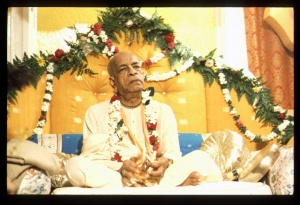CC Antya 7.32 (1975): Difference between revisions
(Vanibot #0027: CCMirror - Mirror CC's 1996 edition to form a basis for 1975) |
(Vanibot #0019: LinkReviser - Revise links, localize and redirect them to the de facto address) |
||
| Line 2: | Line 2: | ||
<div style="float:left">'''[[Sri Caitanya-caritamrta (1975)|Śrī Caitanya-caritāmṛta (1975)]] - [[CC Antya (1975)|Antya-līlā]] - [[CC Antya 7 (1975)|Chapter 7: The Meeting of Śrī Caitanya Mahāprabhu and Vallabha Bhaṭṭa]]'''</div> | <div style="float:left">'''[[Sri Caitanya-caritamrta (1975)|Śrī Caitanya-caritāmṛta (1975)]] - [[CC Antya (1975)|Antya-līlā]] - [[CC Antya 7 (1975)|Chapter 7: The Meeting of Śrī Caitanya Mahāprabhu and Vallabha Bhaṭṭa]]'''</div> | ||
<div style="float:right">[[File:Go-previous.png|link=CC Antya 7.31 (1975)|Antya-līlā 7.31]] '''[[CC Antya 7.31 (1975)|Antya-līlā 7.31]] - [[CC Antya 7.33 (1975)|Antya-līlā 7.33]]''' [[File:Go-next.png|link=CC Antya 7.33 (1975)|Antya-līlā 7.33]]</div> | <div style="float:right">[[File:Go-previous.png|link=CC Antya 7.31 (1975)|Antya-līlā 7.31]] '''[[CC Antya 7.31 (1975)|Antya-līlā 7.31]] - [[CC Antya 7.33 (1975)|Antya-līlā 7.33]]''' [[File:Go-next.png|link=CC Antya 7.33 (1975)|Antya-līlā 7.33]]</div> | ||
{{CompareVersions|CC|Antya 7.32|CC 1975|CC 1996}} | |||
{{RandomImage}} | {{RandomImage}} | ||
==== TEXT 32 ==== | ==== TEXT 32 ==== | ||
| Line 20: | Line 19: | ||
<div class="synonyms"> | <div class="synonyms"> | ||
ittham—in this way; satām—of persons who prefer the impersonal feature of the Lord; brahma—of the impersonal effulgence; sukha—by the happiness; anubhūtyā—who is realized; dāsyam—the mode of servitude; gatānām—of those who have accepted; para-daivatena—who is the supreme worshipable Deity; māyā-āśritānām—for ordinary persons under the clutches of | ittham—in this way; satām—of persons who prefer the impersonal feature of the Lord; brahma—of the impersonal effulgence; sukha—by the happiness; anubhūtyā—who is realized; dāsyam—the mode of servitude; gatānām—of those who have accepted; para-daivatena—who is the supreme worshipable Deity; māyā-āśritānām—for ordinary persons under the clutches of external energy; nara-dārakeṇa—with He who is like a boy of this material world; sākam—in friendship; vijahruḥ—played; kṛta-puṇya-puñjāḥ—those who have accumulated volumes of pious activities. | ||
</div> | </div> | ||
| Line 27: | Line 26: | ||
<div class="translation"> | <div class="translation"> | ||
"Those who are engaged in self-realization, appreciating the Brahman effulgence of the Lord, and those engaged in devotional service, accepting the Supreme Personality of Godhead as master, as well as those who are under the clutches of māyā, thinking the Lord an ordinary person, cannot understand that certain exalted personalities-after accumulating volumes of pious activities-are now playing with the Lord in friendship as cowherd boys.' | |||
</div> | </div> | ||
| Line 34: | Line 33: | ||
<div class="purport"> | <div class="purport"> | ||
This verse is from Śrīmad-Bhāgavatam ([[SB 10.12.7-11| | This verse is from the Śrīmad-Bhāgavatam ([[SB 10.12.7-11|10.12.11]]). | ||
</div> | </div> | ||
Latest revision as of 15:07, 18 September 2020

A.C. Bhaktivedanta Swami Prabhupada
TEXT 32
- itthaṁ satāṁ brahma-sukhānubhūtyā
- dāsyaṁ gatānāṁ para-daivatena
- māyāśritānāṁ nara-dārakeṇa
- sākaṁ vijahruḥ kṛta-puṇya-puñjāḥ
SYNONYMS
ittham—in this way; satām—of persons who prefer the impersonal feature of the Lord; brahma—of the impersonal effulgence; sukha—by the happiness; anubhūtyā—who is realized; dāsyam—the mode of servitude; gatānām—of those who have accepted; para-daivatena—who is the supreme worshipable Deity; māyā-āśritānām—for ordinary persons under the clutches of external energy; nara-dārakeṇa—with He who is like a boy of this material world; sākam—in friendship; vijahruḥ—played; kṛta-puṇya-puñjāḥ—those who have accumulated volumes of pious activities.
TRANSLATION
"Those who are engaged in self-realization, appreciating the Brahman effulgence of the Lord, and those engaged in devotional service, accepting the Supreme Personality of Godhead as master, as well as those who are under the clutches of māyā, thinking the Lord an ordinary person, cannot understand that certain exalted personalities-after accumulating volumes of pious activities-are now playing with the Lord in friendship as cowherd boys.'
PURPORT
This verse is from the Śrīmad-Bhāgavatam (10.12.11).